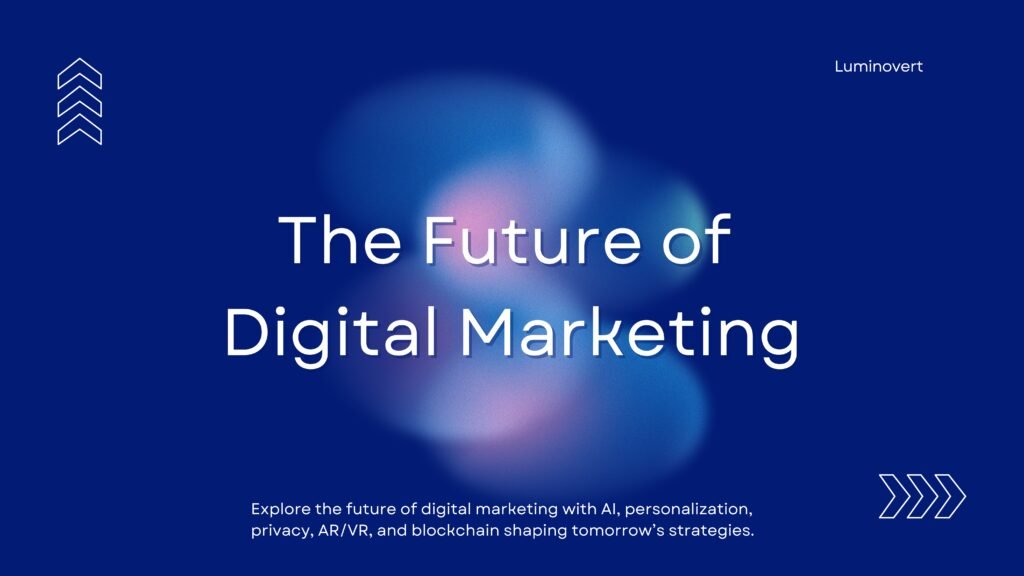Future of Digital Marketing: Trends Shaping Tomorrow’s Strategies
Digital marketing is evolving rapidly, shaped by advances in technology and changing consumer behavior. The future of digital marketing lies in personalized experiences, data-driven strategies, and seamless integration of AI tools. These elements will redefine how we connect with audiences and measure success.
We see automation and machine learning playing a crucial role in optimizing campaigns and predicting customer needs. At the same time, privacy regulations and ethical concerns are reshaping how we gather and use data, making transparency essential.
As marketers, we must adapt to new platforms and technologies that offer real-time engagement and enriched content formats. This shift will create opportunities to drive value more efficiently and build stronger customer relationships.
Emerging Trends in Digital Marketing
We see digital marketing evolving through advanced technologies, increased emphasis on ethics, and new approaches to sustainability. These changes impact how we target audiences, measure success, and align marketing with broader societal expectations.
Artificial Intelligence and Automation
AI is transforming digital marketing by enhancing data analysis and automating repetitive tasks. Tools like chatbots provide real-time customer service, reducing response times and increasing user engagement.
Machine learning algorithms help us optimize ad placements and personalize content at scale. Automation streamlines campaign management, allowing us to allocate resources more efficiently.
With AI-driven insights, we can predict customer behavior and adjust strategies dynamically. This precision increases ROI while reducing wasted spend on ineffective ads.
Personalization and Predictive Analytics
Personalized content has become essential to engage customers effectively. Using predictive analytics, we anticipate user needs based on past behavior and contextual data.
We segment audiences beyond demographics, integrating psychographics and real-time signals. This enables messaging that feels relevant and timely.
Predictive models help forecast purchase likelihood and churn rates, guiding marketing efforts toward high-value prospects. Businesses leveraging this are seeing improved customer retention and conversion rates.
Privacy, Data Ethics, and Regulation
With growing concerns about data privacy, marketers must navigate stricter regulations like GDPR and CCPA. We need transparent data practices to maintain consumer trust.
Ethical data use requires informed consent and minimal data collection aligned with stated purposes. This reduces legal risks and supports brand reputation.
We also invest in privacy-preserving technologies such as differential privacy and federated learning. These help balance personalization with compliance, ensuring responsible marketing.
Sustainability in Marketing Practices
Sustainability influences both consumer preferences and corporate responsibility initiatives. We incorporate eco-friendly messaging and promote products aligned with environmental values.
Digital marketing campaigns now often highlight carbon footprint reductions or ethical sourcing to resonate with conscious buyers.
Internally, we aim to reduce the energy consumption of digital assets, such as optimizing website performance and minimizing data waste. This aligns marketing operations with broader sustainability goals.
Technology Shaping the Future of Digital Marketing
We see digital marketing evolving with innovations that change how consumers interact with brands and how we gather data. These technologies improve engagement, increase personalization, and boost transparency.
Voice Search and Conversational Marketing
Voice search is growing due to devices like smart speakers and voice assistants on phones. Customers use natural language to find products or services, which requires us to optimize content for spoken queries rather than typed keywords.
Conversational marketing leverages chatbots and AI-driven messaging to provide instant responses. This creates real-time engagement and guides users through the purchasing process effectively.
Both voice search and conversational tools help us capture customer intent more precisely, enabling personalized experiences that increase conversion rates.
Augmented Reality and Virtual Reality Experiences
Augmented Reality (AR) and Virtual Reality (VR) offer immersive ways for consumers to interact with products before buying. AR lets users visualize items in their environment, such as trying furniture in their living room via smartphone apps.
VR creates fully virtual environments where users can explore products or scenarios, useful for industries like real estate or automotive.
Implementing AR and VR helps us deliver interactive content that reduces purchase hesitation and enhances brand recall by offering hands-on experiences remotely.
Blockchain for Digital Advertising
Blockchain technology adds transparency and security to digital advertising. It builds trust by verifying ad impressions and clicks, reducing fraud caused by bots or false data.
With blockchain, we can track the entire advertising supply chain, ensuring accurate payments and safeguarding user privacy through decentralized data control.
This technology promotes accountability and improves ROI by confirming that advertising budgets reach genuine audiences, which is critical as privacy regulations tighten globally.

